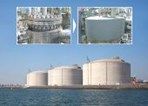Effective Thermal Insulation Of Liquefied Gas Pipes With BASF Foam Basotect

BASF's specialty foam Basotect is now for the first time used to insulate pipes in a liquefied natural gas (LNG) tank terminal in Gwangyang, Korea. The pipe cover with Basotect provides energy-efficient thermal insulation, easy handling and flame retardancy. LNG is natural gas which is temporarily liquefied at very low temperatures, in order to transport or store it more easily. As the temperature of LNG must be kept below -162°C, efficient insulation for the pipes is necessary.
According to SKI Insulation, the system supplier of the removable insulation cover, the pipe cover made from Basotect is more energy-efficient as it is 20 percent thinner and provides up to 50 percent better thermal insulation than conventional foam insulation. "Basotect shows a high degree of stability at low temperatures. In laboratory tests even at temperatures of around -200°C the material retains its properties. The high degree of elasticity and the thermal insulation capacity of the foam remain unaffected, in contrast to conventional foam insulation, which becomes brittle when exposed to such extreme cold ," said Dr. Peter Wolf, Head of Global Business Management Basotect at BASF.
Basotect can be installed and handled in an easy and cost-effective way. SKI Insulation discovered that the system material with the lightweight and flexible BASF foam can be easily removed for regular inspection of pipe integrity and later reused, unlike rigid conventional foams that are hard to replace. This translates into reduced maintenance costs. Additionally, Basotect is a highly flame-retardant material, another key consideration for SKI Insulation as natural gas burns easily.
SOURCE: BASF
